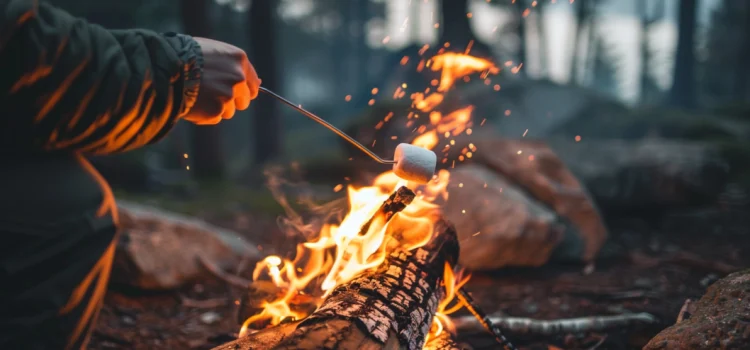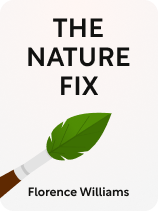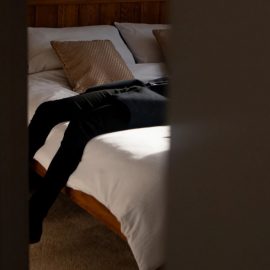

This article is an excerpt from the Shortform book guide to "The Nature Fix" by Florence Williams. Shortform has the world's best summaries and analyses of books you should be reading.
Like this article? Sign up for a free trial here.
In what ways can nature heal you? What are the benefits of listening to songbirds? Why does smelling eucalyptus make you feel relaxed?
If you’re feeling stressed, depressed, or in a funk, consider the last time you went outside. In The Nature Fix, Florence Williams contends that humans have an innate affinity for nature, and thus the antidote to many of our physical and mental ailments is a good dose of the outdoors.
Keep reading to learn about the benefits of time in nature, according to Williams.
The Benefits of Being Surrounded by Nature
According to Florence Williams, humans are losing touch with nature because we’re now predominantly city-dwellers, and this has impacted our health and well-being. This shift to urban living is causing people to experience increased stress, poor sleep, a lack of sunlight, and more. Here are the benefits of time in nature for your mental and physical health.
1. Nature Reduces Stress
Williams writes that spending time in nature can reduce stress. Research in Japan supports this: In response to the high levels of stress and burnout in the country’s workforce, it has included the practice of shinrin-yoku (forest bathing, or immersing yourself in the forest) in its national health program, offering a network of forest therapy trails and facilities to its citizens. Walking through forests has been found to lower levels of cortisol (a stress hormone), heart rates, and blood pressure, and it also reduces anxiety.
(Shortform note: Despite facing various issues at different times and places, people seem to find the antidote in nature. While the Japanese introduced forest bathing in the 1980s as a response to its workforce’s mounting stress, the European Romantic movement advocated going back to nature in the 18th century as a response to capitalism and urbanization. Whereas forest bathing is meant to address ailments like heart problems and anxiety, the Romantics saw nature as a source of emotional and spiritual rejuvenation.)
Part of nature’s stress-reducing properties comes from sound, says Williams—we respond especially well to the sound of water and birds (but think songbirds instead of crows). (Shortform note: Some research suggests that different nature sounds address different needs—water sounds, like waves, may be better for improving mood, while bird sounds may be better for reducing stress.)
Williams adds that on top of its soothing sights and sounds, nature’s smells also contribute to reducing stress. Scents have a potent, immediate effect on us because they skip the bloodstream and go straight to our brain. (Shortform note: Natural scents like lavender have been shown to reduce stress, but there can be too much of a good thing—your nose gets used to a smell the more you’re exposed to it. So it might be best to limit your aromatherapy sessions.)
Some natural scents—such as pine and eucalyptus—have long been used in aromatherapy to promote relaxation, alleviate stress, and improve sleep. Williams does add that further research needs to be done to support aromatherapy’s healing effects. (Shortform note: The scents of trees that provide us with soothing and restorative benefits may serve a vital function among trees, demonstrating the complex relationships at play in the natural world. In The Hidden Life of Trees, Peter Wohlleben contends that trees release scents to communicate with each other, warning each other of danger (say from herbivores or insects) or attracting insects that can aid in pollination and protection.)
2. Nature Boosts Our Immune System
According to Williams, studies have found that nature can help us stay healthy or recover from illness. Research shows that people who engage in forest bathing have an increase in the activity of their natural killer immune cells, a type of white blood cell that helps fight off cancer. (Shortform note: Greens help fight cancer in more ways than one. While Williams says being surrounded by a forest can boost the activity of cancer-fighting cells, Michael Greger says getting plants in you can also help keep cancer at bay. In How Not to Die, Greger argues that plant-based diets can prevent various cancers like blood, breast, and prostate cancer.)
Williams also cites other research that found that hospital patients who had a view of nature recovered faster and needed less pain medication than those who had a view of a brick wall. (Shortform note: Other research reveals that nature has a positive effect on more than just the patients—one study found that hospital gardens not only help patients recover faster but also alleviate stress for family members and hospital staff.)
3. Nature Improves Cognitive Function and Creativity
Another benefit we get from being in nature is that it enhances our cognitive function and boosts creativity. Williams cites studies where groups of people went on trips to the wilderness for three to four days to go rafting, hiking, and camping while being disconnected from technology. Participants’ cognitive abilities—including attention, memory, and creative problem-solving—all improved after their trips. This suggests that ART was at work: Nature provided participants with an opportunity to engage in soft fascination, giving their directed attention a break and boosting their brain power.
(Shortform note: What if you need a creativity boost but don’t have access to nature or the time or resources to immerse in a days-long wilderness trip? Other authors have alternative suggestions. Austin Kleon writes in Steal Like an Artist that you can find inspiration from other people doing similar work. He argues that no work is wholly original, and all creators are influenced by other creators, so fill your space with ideas and objects that can move you to create. Another tactic is to get in touch with your spiritual side: In Seeking Wisdom, Julia Cameron explains that this begins by finding and connecting to your own image of God and then regularly reciting prayers of request and appreciation.)
4. Nature Improves Our Mental Health and Social Connectedness
Williams cites research that nature can be as effective as medication in treating mild to moderate depression. For example, in Sweden, horticulture therapy, or gardening as a form of treatment, has been shown to reduce symptoms of anxiety and depression. (Shortform note: Experts give tips on how to get the benefits even if you don’t have access to structured horticultural therapy: Start with a houseplant, and don’t worry if your first attempt at caring for one isn’t successful. Sit in a spot where you’re closer to plants, even if it’s just potted herbs on your windowsill. And set goals to help you feel a sense of achievement—for example, you might want to grow a vegetable garden with the goal of cooking using only ingredients from there.)
While even short doses of nature—such as a quick walk in a city park—can provide a mood boost, Williams argues that more immersive experiences can have more profound and lasting effects. (We’ll go into detail about her recommended doses of nature later in the guide.)
She gives the example of a river-rafting trip in Idaho, designed for a group of US veterans suffering from post-traumatic stress disorder (PTSD). Nature not only provided a soothing environment for the participants but also challenged them as they navigated the river and the wilderness as a team. This was combined with therapy sessions and activities to help participants process their experiences. Williams says that after the trip, many of the participants experienced reduced PTSD symptoms and reported feeling more connected, empowered, and hopeful.
(Shortform note: Some immersive programs like the river-rafting trip in Idaho can be helpful, but others might leave participants with more trauma than they started with. According to reports, there are around 40 wilderness therapy programs (as of 2022) geared toward “troubled” teens in the US, meant to teach the importance of accountability and choices. But some people are calling for a closer look at these programs after several instances of death (from, among other causes, heatstroke and injuries from being restrained) and allegations of dehumanizing experiences and other abuse of the participants.)

———End of Preview———
Like what you just read? Read the rest of the world's best book summary and analysis of Florence Williams's "The Nature Fix" at Shortform.
Here's what you'll find in our full The Nature Fix summary:
- Why humans have an innate affinity for nature
- How some countries are supporting their citizens’ health by giving them better access to nature
- Why the antidote to many of our physical and mental ailments is a good dose of the outdoors






